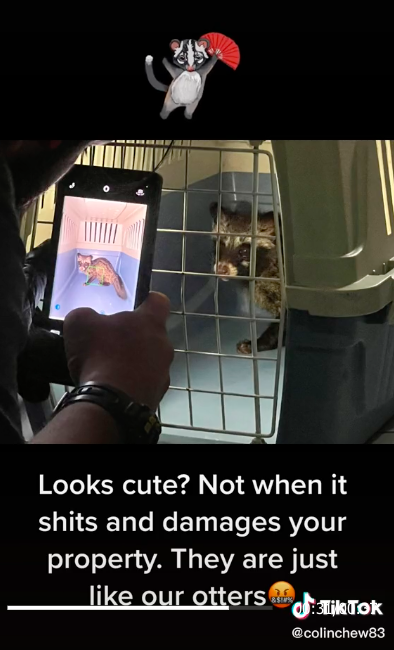Civets are prized creatures in many parts of Asia (kopi luwak, anyone?) but for one Singaporean household, they were more of a bane than a blessing.
However, after six years, the man won over nature.
In an Aug 13 TikTok, Mr Colin Chew wrote: “Finally, After 6 years of battling this creature. Kudos to Nparks and Nparks contractors! Thank you so much! @National Parks Board Singapore #singaporetogether #civetcats #sgtiktok #fyp“
@colinchew83 Finally, After 6 years of battling this creature. Kudos to Nparks and Nparks contractors! Thank you so much! @National Parks Board Singapore #singaporetogether #civetcats #sgtiktok #fyp
Mr Chew wrote in his video that he had wondered why he heard a thump on his ceiling, which was “slightly damaged.”

 This was followed by a clip of NParks personnel catching a small animal and putting it into a carrying case.
This was followed by a clip of NParks personnel catching a small animal and putting it into a carrying case.

Gently handling the furry creature—which was a palm civet—the NParks men carefully secured it into the case.
Mr Chew wrote, “Look cute?
Not when it s**ts and damages your property.
They are just like our otters.”

It says on the NParks website that the civet can be found both in urban and forested places around Singapore, and is commonly known as musang or toddy cat.
“This omnivore feeds on small prey and fruit, and defecates viable seeds, making it a potential seed disperser. In Singapore, civets face the threat if being trapped or becoming roadkill due to the proximity of the civet habitats to humans,” NParks added.
Civets have secretions from their anal scent glands that smell like pandan, and NParks adds “So if you ever smell pandan in an area without such plants, keep your eyes peeled for these shy creatures, recognisable by the presence of a black facial mask across their eyes.”
Commenters on the post are wondering why it took so long for the civet to get caught.




Others tried to get the TikToker to look on the bright side, saying he’d have a supply of kopi luwak, which is made from partially digested coffee cherries eaten and then defecated by the Asian palm civet.




/TISG
ICYMI: Baby civet found crying and covered in red ants at Holland Road, safely rescued by NParks

